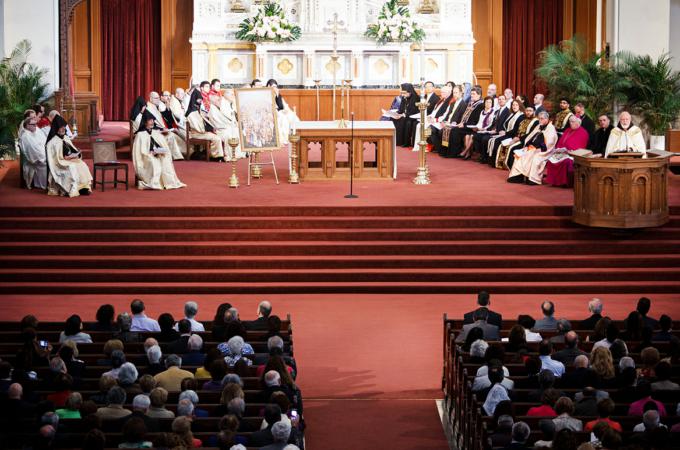Prayer service recalls Armenian Genocide
SOUTH END -- The haunting drone of Armenia's national instrument, the duduk, echoed through the Cathedral of the Holy Cross, marking the beginning of the Archdiocese of Boston's first ever commemoration of the Armenian Genocide, April 23.
Cardinal Seán P. O'Malley presided at the ecumenical service, alongside Archbishop Khajag Barsamian of the Eastern Diocese of the Armenian Church of America, Archbishop Oshagan Choloyan from the Eastern Prelacy of the Armenian Apostolic Church, vicar general Msgr. Andon Atamian of the Armenian Catholic Eparchy of the United States and Canada, and the Reverend Avedis Boynerian, of the Armenian Evangelical Union of North America.
Also at the service were representatives from the Anti-Defamation League, the Anglican Diocese in New England, the Community of Sant'Egidio, the Coptic Orthodox Church, the Emanuel Gospel Center, the Evangelical Lutheran Church in America, the Focolare Movement, the Islamic Center of Boston, the Massachusetts Council of Churches, and the Syrian Orthodox Church.
In his homily, Cardinal O'Malley spoke on God's unfaltering love for his people, and how we must never forget that love, "especially in moments of darkness and pain."
"It is that faith, that memory, that conviction, that allows us to recall the genocide of a century ago, and to know that the love and power of God is stronger than death. Christ's cross has conquered sin and death for us," the cardinal said.
"By the same token, it is important that we do not allow the events of the genocide to slip into oblivion. We must raise the alarm, we must keep the memory alive, so that the future will be safer," he continued.
He noted that by remembering instances of mass slaughter, such as the Armenian Genocide and the Holocaust, we can help to "prevent more genocide in the future."
"We must never allow the world to vilify people because of their race, their religion, their nationality, their language, their politics. The world needs the voice of a sentinel, crying out the warnings of danger that lurk when people nurture the darkness of hatred and prejudice in their hearts," he said.
The cardinal drew to mind the murder of Christians around the world by the Islamic State, and invoked the words of Pope Francis.
"Pope Francis in an interview that he gave over a year ago used the term 'ecumenism of blood.' The Holy Father commented on how in some countries they kill Christians for wearing a cross or for having a bible. They do not ask whether they are Catholics or Anglicans or Lutherans or Orthodox -- they are killed because they are Christians," he said.
"Pope Francis said 'We are united in blood even though we have not yet managed to take the necessary steps toward unity among us, and perhaps the time has not yet come. Unity is a gift we need to task for,'" he continued.
"Hopefully the example and the witness of the faith of these martyrs will help us to grow closer to one another and be more faithful to our vocation as disciples of Jesus Christ," the cardinal said.
Archbishop Oshagan Choloyan offered an address, in which he congratulated Pope Francis for acknowledging the Armenian Genocide on the 100th anniversary of the event last year.
"His Holiness, Pope Francis, has stood firmly on the side of the truth and morality. When he acknowledged the first genocide of the 20th century, his declaration prompted similar acknowledgments from many more organizations and countries, beginning with the European parliament," he said.
"Today's event, hosted by His Eminence Cardinal Seán O'Malley at the Archdiocese of Boston, is a continuation of that Christian solidarity. Behold how good and how pleasant it is for brothers to dwell together in unity," he continued.
In his own address, Archbishop Barsamian also noted Pope Francis' acknowledgment, and thanked Cardinal O'Malley for hosting the prayer service.
"Today, thanks to the generous spirit of His Eminence Cardinal O'Malley, we are again honoring the memory of those who perished 101 years ago, and it is fitting that we should do so beneath the cross of Christ, for the cross illuminates the meaning of the genocide," the archbishop said.
"It is the reminder of our Lord's passion, in which Armenian Christian shared a century ago, in which other people would later share, and in which, people are sharing down to our own days. But, the cross is also a symbol of victory over suffering, the victory promised by god to his faithful servant," he continued.
A number of the hymns and prayers were said in Armenian during the service, including the Hymn for the Holy Martyrs' of 1915, which called on the martyrs of the genocide to beseech God to keep Armenia in peace.
Following the service, a reception was held in the Cathedral High School Gymnasium, where there was an exchange of gifts between the Armenian and Catholic bishops.
Robert Trestan, the director of the New England Regional Office of the Anti-Defamation League, was an attendee at the prayer service. He spoke to The Pilot on the importance of remembering genocide.
"Unless you honor the people who were lost and continually remember and acknowledge the genocide, you run the risk of it happening it again," he said.
"And so, it's critical that people regularly come together and learn what happened," he continued.
Middlesex County Sheriff Peter Koutoujian, an Armenian Catholic, was also present, and noted the importance of the service.
"This is just a continuation of a great moment that we had with the pope remembering the martyrs of the Armenian Genocide, and acknowledging and recognizing the Armenian genocide. This is a powerful moment for our community," he said.




















